
Movies
Top Fives
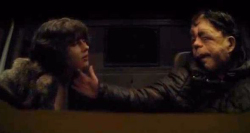
Tony's Top Ten: Best Films of 2014
Filed under: Top Fives
There is no denying that 2014 was the year of Birdman and Boyhood. Say what you will about 'em, but they made a massive impact on audiences. I loved both films, but unfortunately, they didn't quite make this list. That alone should be indicative of how many amazing films were released this year. I'm still just catching up with everything. I suppose what I'm saying is to please be understanding if your favorite movie didn't make the cut. There were so many great films from which to choose.
Just take a glance at my Honorable Mentions. I recommend them (almost) as highly as I do the listed films. Enjoy!
Honorable Mentions: (in no particular order) Tim's Vermeer, Birdman, John Wick, Boyhood, The Babadook, Two Days One Night, Guardians of the Galaxy, Gone Girl, Edge of Tomorrow, The Guest, Force Majeure, Foxcatcher, Still Alice, Calvary, Life Itself, Listen Up Philip, A Girl Walks Home Alone at Night, Ida, Jodorowsky's Dune, Cheap Thrills.
10. Nightcrawler/Enemy
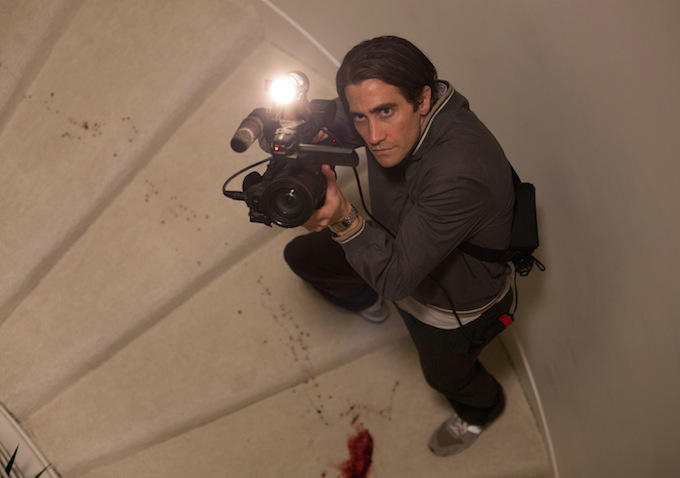
As a leading man, Jake Gyllenhaal is making fantastic career decisions lately. The one-two punch of Enemy and Nightcrawler should cement his place as one of the most daring performers of his generation. In fact, the latter should have also garnered him an Oscar nomination.
"I like to say that if you're seeing me, you're having the worst day of your life," says Nightcrawler's Lou Bloom.
Lou (Gyllenhaal) is the most contemporary lead character on this list. He's a walking, grinning personification of the times. Unemployment rates remain high, hope remains distant and jackals like Lou are thriving. He's very good at his job and he's not afraid of blackmailing those around him to get what wants. He's a seemingly unemployed drifter who stumbles into the world of L.A. TV crime journalism.
Many have compared Lou to Travis Bickle (Robert De Niro) from Taxi Driver. Rightly so. They're both social misfits on dangerously misguided, self-appointed missions. The difference? The well-intentioned (that's right, folks) Travis was trying to help someone, in an albeit psychotically confused manner. On the other hand, Lou is only interested in selfish goals.
Nightcrawler climaxes with a carefully choreographed chase sequence, which Lou orchestrates like he's shooting an action movie. Except the bullets are real, as is the blood. It's a film that will be remembered for its lead performance, even though the surrounding story is immaculately told.
Enemy will always be remembered for its surreal finale, a scene of such disturbing strangeness, it left me haunted for days. I've read through countless explanations from bloggers, citing metaphors and symbolism to no communal consensus. No two explanations concur. It's not the only film on this list that appears to be a puzzle purposefully designed to have no solution. But there is a solution, of course: our hero's girlfriend transforms into a giant spider. What's so confusing about that?
I'm kidding. But seriously, if you require an explanation for Enemy, you've totally missed the film's point.
8. Blue Ruin
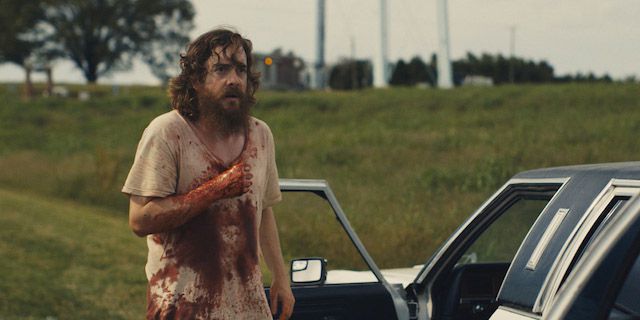
The last thing you'll hear watching Blue Ruin is the song, "No Regrets" by Little Willie John. That sentiment, no regrets, is delivered with a ruthless, icy blow. We believe it. No regrets. No regrets.
The plot follows Dwight (Macon Blair) an apparently homeless man, living out of his car. The police inform him that someone is to be released from prison. They wanted him to be somewhere safe when he found out, as we will learn that our hero's family has been destroyed. They're all gone, except his sister, who lives upstate. Dwight believes (for reasons I won't spoil) there is someone to blame for this tragedy, and that person just got out of jail.
Revenge is a well trodden theme in cinema, but rarely is the subject handled with such amazing simplicity and precision. Blue Ruin is a deep, dark, violent and heartbreaking independent film. Shot on a tiny budget, in a sense it's the modern Clerks, or El Mariachi, or Primer, or The Brothers McMullen. Stylistically, it's 70s era William Freidkin meets art-house era Steven Soderbergh.
At one point, during a conversation with his sister, Dwight will say: "I'm sorry, I'm not used to talking this much."
Our protagonist has been utterly devastated by what happened. His desire for revenge is clear and nearly understandable. However, he's far from the grizzled, gun-toting revenge seeker with which we're familiar. When his beard comes off, he's a short, pudgy office clerk. He knows nothing of weapons and violence, his ineptitude demonstrated with a knife in the bathroom of a seedy bar. He's a novice in the vengence game, which makes his struggle all the more fascinating.
Blue Ruin is a darkly disturbing revenge tale about two broken families, brought together and then, torn apart by violence.
Like I said, no regrets. No regrets.
7. Some Velvet Morning
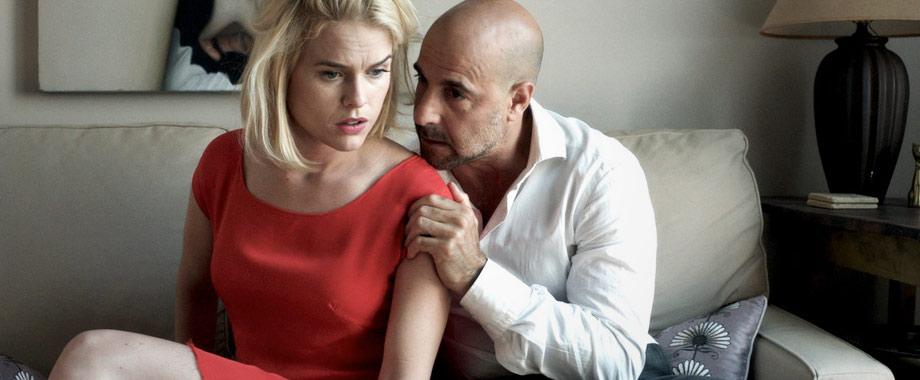
Neil LaBute's mastery of a vicious style of comedic storytelling has been all but forgotten, thanks to films like The Wicker Man and a 2010 remake of Death at a Funeral. Both were misfires, which contained admittedly entertaining elements. One inspired a cult following, including a fine episode of the How Did This Get Made podcast, and the other is a genuinely funny, but totally pointless remake. Odd choices for someone who began his career as an acclaimed playwright.
LaBute's In The Company of Men and Your Friends and Neighbors are pitch black indie masterpieces. Even the oddball road comedy, Nurse Betty is an woefully under-appreciated gem. His newest, Some Velvet Morning is a return to form in that sense. Based on his own play, the film stars Alice Eve and Stanley Tucci as a man and woman who seem to have been lovers in the past. He arrives at her door carting luggage, announcing that he's left his wife.
She's stunned, but reluctantly invites him inside. They talk, at first politely. Then, passions overflow and the conversation becomes darker. Tension begins mounting the moment our lovers are reunited. Is everything exactly as it seems? Perhaps not.
Both actors are top notch, but Eve rises beyond her co-star, delivering what should have been a star-making performance, if more people had seen the film. Eve has stood out in smaller roles in the past, notably 2009's Star Trek, but this by far her best performance to date.
To say we are heading towards a shocking, emotionally barbaric conclusion would be an understatement. Neil LaBute, talented as he may be, is one of America's angriest writers. The film's denouement is revealed like a stylistically jarring slap in the face. You're left reeling, forced to reevaluate everything you've seen.
Some Velvet Morning is perfect dramatic sleight of hand. LaBute had a rabbit up his sleeve the whole time.
6. Under the Skin

Under The Skin is a unique blend of sci-fi and horror, executed in a Kubrickian, almost experimental style. Director Jonathan Glazer (Sexy Beast, Birth) is an towering visual talent, working at the top of his game. Under the Skin is his most ambitious feat, an all-or-nothing swing for the fences. It's undoubtedly the most polarizing film on this list.
Scarlett Johansson stars as an alien sent to Earth, clad in human skin. She drives the Scottish countryside, luring unsuspecting men to their deaths. She uses her body as bait, which of course, the men will never catch. What do they want with us? To eat us? Experiment on us? It's left ambiguous.
She's shadowed by a man on a motorbike, another alien, who cleans up any messy situations she leaves behind. The narrative is fairly straight forward until she meets a man suffering from Proteus syndrome. She's about to do away with him, when she suddenly pulls him to safety and allows him to escape. She feels sympathy for him, which is secondary to one very alarming fact: she feels. Is this alien creature developing human emotions?
One of the film's best moments involves a young couple with a baby picnicking on the beach. It's a pleasant Scottish day. Johansson's character watches from down the sand, unblinking eyes fixed on a swimmer who has just returned to shore. By the end of the scene, the parents will have drowned and the swimmer's head will be smashed against a rock, the baby left screaming and alone on the vacant beach.
Unlike Pinocchio, there will be no happiness at the end of this tale. She will not become a real girl. Jonathan Glazer's Under the Skin blends ingenious sci-fi and contemporary horror with masterful precision.
5. The Grand Budapest Hotel
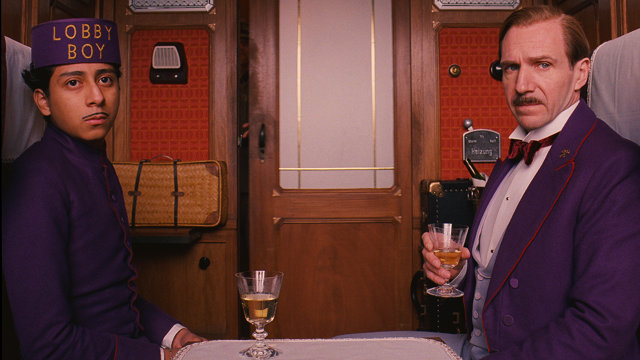
What a strange career Wes Anderson has. It began with a quirky, off-beat indie hit called Bottle Rocket, a film that even many hardcore Anderson fans didn't like. I loved it, and immediately fell in step behind Anderson, scurrying to the theater for each of his following works. My favorite remains 1997's Rushmore, another film that would be considered more of a cult classic than a mainstream hit. It's just so strange to realize The Grand Budapest Hotel was nominated for Best Picture, given the critical reactions his works have received in the past.
What changed? Why did it change? I ask because... I don't think Wes Anderson has changed his style or approach at all. Instead, his audience has changed.
Every Wes Anderson film is about families, or surrogate ones. Most are wounded and melancholy, and The Grand Budapest Hotel is no exception. Young Zero finds himself working as the lobby boy at the Grand Budapest, under the wise eye of M. Gustav, played by Ralph Fiennes. An aged Zero narrates the story which may seem like autobiography, but it's really all about Gustav, a charming, but vain hotel concierge.
It's impossible to write about this film without acknowledging the ending. We learn that our endearing hero Gustav was marched into a snowy barley field and shot. That our co-hero, Zero Mustafa lost his wife and child to illness. The bad guys won. The world in which they live has become extinct.
Later, Zero will sadly admit to the writer (Jude Law and as an older man Tom Wilkinson) the narrator of this tale: "(Gustav's) world had vanished long before he entered it. But he sustained the illusion with a marvelous grace."
In the end, the film is about a glorious and long forgotten world. It may be gone, but we can still visit this land anytime we wish. It's beating heart can still be found within Wes Anderson's The Grand Budapest Hotel.
4. Whiplash

Legendary screenwriter William Goldman said the reason The Sting played so well with audiences was the endearing power of the final sequence. People were so swept up in the shocking denouement, they gladly forgave the remainder of the movie's flaws, if there were any. You're sent out of the theater in a nearly euphoric glow, and the same could be said of Whiplash.
With our hearts pounding, we are heaved skull-first into the end credits, frenzied and out of breath, even though we've only been watching a movie. Luckily, the rest of the film that precedes that scene is also spectacular, thanks to its lead performers. First-time writer/ director Damien Chazelle may have won the casting-lottery with this film.
Andrew Neiman (Miles Teller, The Spectacular Now) is a drummer and a student at the respected Shaffer School of Contemporary Music in New York City. He quickly finds himself dragged under the wing of Fletcher (J.K. Simmons, Juno) the most intimidating and fearsome teacher at the school. Simmons is perfectly manic and precise in a role that landed him a well-deserved Oscar.
It's part He Got Game and part Full Metal Jacket, if you replaced basketball and Vietnam with jazz drumming. Simmons' performance is immediately reminiscent of those aforementioned masterpieces... Denzel Washington as the almost psychotically dedicated parent of a brow-beaten young basketball prodigy... and R. Lee Ermey as the first, last and only required cinematic Drill Sargent. Simmons' performance is unquestionably at that level.
Teller nails his performance as well, dripping blood and sweat in nearly every scene. I've spoken to musicians who say that if you drum until your hands bleed, you have bad drumming technique. Maybe so. However, cinema is rarely about conveying journalistic reality. It's more often about conveying tone and feeling. In that sense, Whiplash is a masterpiece.
3. Frank
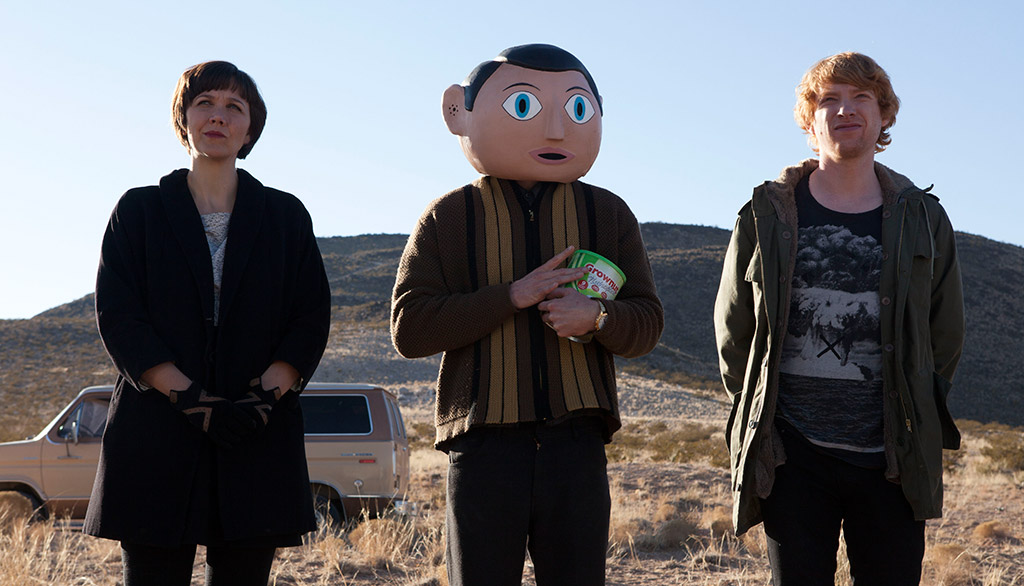
Frank is a rare tragicomic masterpiece, one that will surely divide audiences. Jon (Domhnall Gleason) is a young office worker who writes songs in his spare time. He adores music, and dreams of an artist's life. His silly songs display a true creative zest, even if the final product might not be Rick Rubin's cup of tea.
Jon stumbles into a chance to play with Frank (Michael Fassbender) and his band, the name of which is intentionally unpronounceable. Frank has a peculiar trait: he wear a large fake plastic head, an over-sized mask concealing his face. And he never removes it. Jon accepts Frank-- only to find himself dragged into this madcap world as the band hits the road in their cramped retro minivan.
As the titular Frank, Fassbender is at the top of his game, aggressively playing down his movie star baggage in the few short scenes in which he's unmasked. Even in the rawest moments of Steve McQueen's Shame, Fassbender was never this painfully vulnerable. The character was inspired by Frank Sidebottom (a British cult music icon who really wore a fake plastic head), as well as oddball music legends such as Daniel Johnson and Captain Beefheart.
The thing that makes Frank an object of fascination for the hipster show business types at SXSW is the head, and the mystique that surrounds it. They've seen a few garbled YouTube videos of Frank but nothing more. It is that surreal fake head that draws them to him.
Sadly, that head is the manifestation of Frank's crippling mental illness. When we see his real head, he's not the pulsating, rock-god artiste that we all imagined. Instead, Frank is a broken and wounded soul, using music as a form of therapy. It's only when he's creating his art that he's truly at peace. Whether or not Frank was aware of that is irrelevant. He just wanted to make music.
Excerpted from Tony's previously published review. Full version available here.
2. Locke
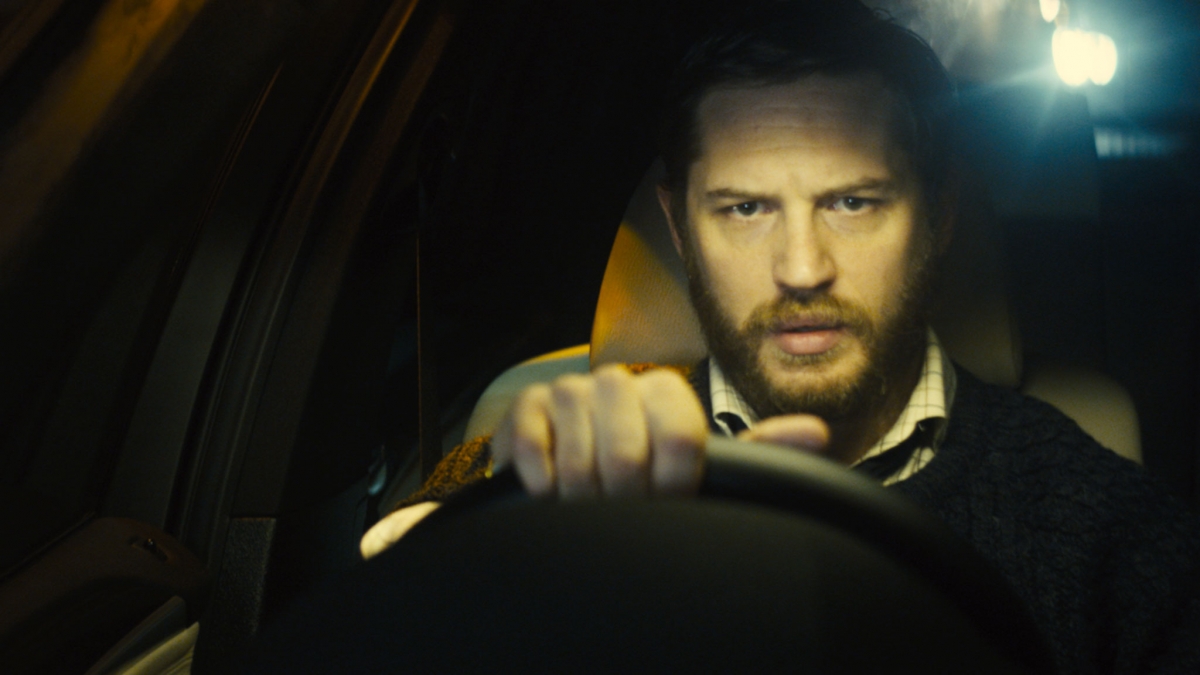
Admittedly, the word underrated gets thrown around far too often by film critics. But if the shoe fits...
Ivan Locke (Tom Hardy, The Dark Knight Rises) is driving home from work one night. He waits at a stop light, his right turn-signal clicking. At the last moment, he flips the turn-signal to the left and goes in a different direction. At the last moment, he changes his mind. He isn't going home tonight. In fact, he may never see his home ever again.
Locke is a good man who made a mistake. One simple mistake. That mistake is about to manifest itself. He cannot ignore it. Before he deals with the manifestation face to face, he must confess his sins. He's got a cell phone. He has 90 minutes alone in a car with his thoughts and his father's ghost. This seems like an ideal time for a confession.
The screenplay, which forces Locke into that car for the entire running time, is one of the year's best. Even the off-camera characters are immediately compelling and engaging. Despite the many voices we hear via Locke's phone, Tom Hardy is the only actor who appears on screen. His performance is the most powerful I've seen all year. Perhaps the film is too insular and the character too intense for mainstream Academy voters, as it was not nominated.
Despite the contained nature of Locke, it's an immensely suspenseful humanist tale. Instead of shootings and explosions, simple decisions made by flawed people keep you on the edge of your seat. I've desperately avoided revealing plot details for a reason. Locke tells his story much more eloquently than I ever could.
1. Inherent Vice

"You were always there for me, Doc," she says. "I mean it. Always."
That line is spoken by Shasta Fay, the ex-old lady of our hero, private eye Doc Sportello. It comes right after she's tasked him to locate her new squeeze, some sun-ripened old real-estate millionaire named Mickey Wolfman, recently gone missing. Doc was always there for Shasta. And so, he had to be there for her, one last time.
Confused? Well, so is Doc, a possible byproduct of the billowing clouds of pot-smoke haloing his hippie-fro. Adapted from Thomas Pynchon's novel, Inherent Vice offers up no easy solutions or crowd-pleasing denouements, mainstream details that fans of the work of Paul Thomas Anderson (or Pynchon) would hardly expect. Critics were easier on the cheerfully puzzling The Master than this goofy journey through the past, to quote the great Neil Young.
Featuring the finest and most provocatively employed soundtrack of the year (including not one but two amazingly underplayed songs by the aforementioned Neil) P.T. Anderson weaves us into his strangely specific tapestry of Pynchon amidst the fading beauty of 70's Los Angeles. It's psychedelic psuedo-noir mixed in with a smattering of manically silly, Marx Brothers-esque comedy. The comparisons to Robert Altman's The Long Goodbye seem based only on the obvious surface details. Inherent Vice owes more to Anderson's other cinematic step-father named Robert: Mr. Robert Downey Sr. and films such as Putney Swope and Two Tons of Turquoise to Taos Tonight.
In one of the film's best scenes, Doc flashes back to a memory of his happier days with Shasta, playing with a Ouija board. Bizarrely, that happy/sad memory somehow leads him to the next piece of the puzzle. Indeed, the plot will conclude with Owen Wilson's character, a druggie musician caught up in a "vast" conspiracy. However, this ever expanding mystery seems somehow hinged on Doc's broken relationship with Shasta. It brings to mind (in a loopy, tangential fashion) a line from Magnolia, one of Anderson's earlier L.A. films: "We may be through with the past, but the past ain't through with us."
Inherent Vice may be (arguably) the most confounding film of the 2014, but it's also the most entertaining.
Tags: Top 10, Whiplash, The Grand Budapest Hotel, Frank, Locke, Enemy, Nightcrawler, Under the Skin, Inherent Vice, Some Velvet Morning
Related Posts
- Detecting the Marvelous - Straight to the Top 10
- The 10 greatest moustaches in film and television history (plus a few more)
- 2015 Oscars: Red Carpet videos, live tweeting of the ceremony, and tales from L.A.
- Review: Frank
- Tony's Top Ten: Best Films of 2013
Tony Hinds is a Canadian writer who studied film at the University of Winnipeg. In addition to ShowbizMonkeys.com, Tony has reviewed films for Step On Magazine and The Uniter. You can find Tony on Twitter.




Comments Posted (